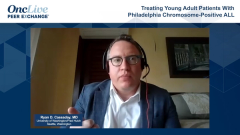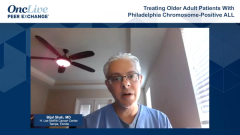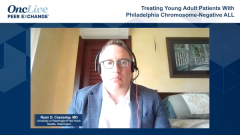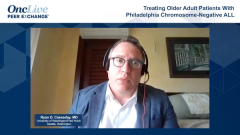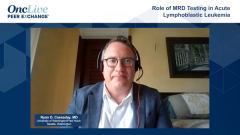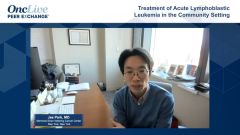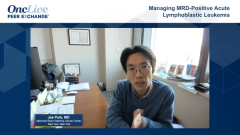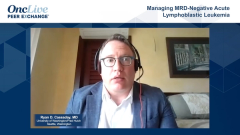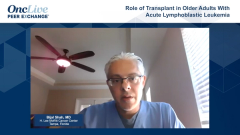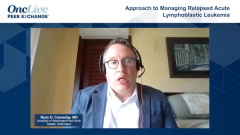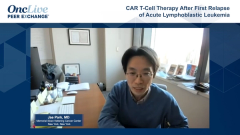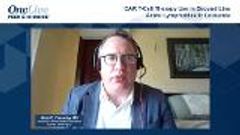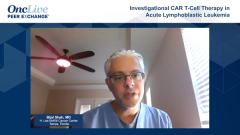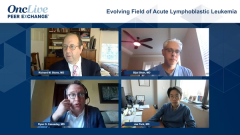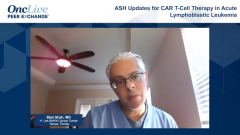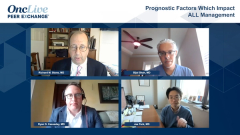
Treatment of Acute Lymphoblastic Leukemia in the Community Setting
Episodes in this series

Richard M. Stone, MD: Do you think this is done in the community, Ryan?
Ryan D. Cassaday, MD: No, not as universally as I think we’d like. There are several barriers to that. Outside of academic practices, it’s not clear who is doing the bone marrow test, who’s ordering the test, and what laboratories are available to perform the test—whether it’s contractual obligations that the clinic has with a hospital or a reference laboratory. Another steep hill that we have to climb as an ALL [acute lymphoblastic leukemia] community is that for every other hematologic malignancy, with a few exceptions like APL [acute promyelocytic leukemia], MRD [minimal residual disease] is still generally a research tool.
While there are interesting and provocative data in CLL [chronic lymphocytic leukemia], myeloma, and to a certain extent AML [acute myeloid leukemia], ALL is the 1 disease where very few would debate about the standard nature of MRD in terms of making treatment decisions because it’s so rare. Many community doctors don’t necessarily see it, so they may just immediately assume MRD is a research test, so they’re not going to order it. It’s not uncommon for me to see a referral from a community practice where MRD is not being assessed at all, or certainly not in the manner that we’ve espoused here.
Richard M. Stone, MD: Do you even see ALL being treated in the community? We see AML. But ALL? What do you think about that?
Jae Park, MD: I used to think that with ALL therapy, why would anybody treat this if you see only 1 or 2 cases per year? But to my surprise, their first therapy they often get in not super-small communities, small or midsize centers that may see 1 or 2 patients with ALL—less than 10—a year. When you see it that infrequently, MRD is a level of concern because it’s not the standard for AML and any other disease. They don’t think about them. They might not have the equipment. For a disease that’s curable and first-line therapy matters, we’re trying to go out and educate that where you receive your first treatment matters. By the time we see the relapsed patients, it’s often too late. Not that I’m sure that I’m going to make a difference, but there are other things that we could have done.
Richard M. Stone, MD: I don’t see it in small community hospitals. But in midsize places like in northern New England, there are some cities there that will do it. But then when the patient goes bad, they come to Boston and it’s a hassle because they’re ripped away from their community. Maybe if they had started there it would have been better. What do you think, Bijal? Florida is a big state.
Bijal Shah, MD: What we at Moffitt Cancer Center get is many patients who will receive their induction locally and then get transferred after that for a consultation. I empathize with the local provider. It’s not as if they’re not making the call: “Hey, I’ve got this patient, they’re sick, they need to be sent to a tertiary care center.” But oftentimes they’re young, they’re uninsured, they’re still working on the Medicaid or whatever it may be to support them through that process. Maybe they’re just too sick—their white count is 150,000 per mm3, and they’re trying to do whatever they can to temporize things.
I don’t know the answer. Insurance doesn’t pay for lodging. They sometimes don’t even pay for the medicine. How do you get a patient to your referral center from 600 miles away?
Richard M. Stone, MD: It’s very challenging. It’s part of a larger discussion.
Jae Park, MD: A lot is patient driven too. Patients don’t want to travel long distances to receive treatment. They are ripped away from their social support which is hard for them. They’re looking for therapy that they can get closer to their homes. It’s up to us to develop such therapy that can be easily delivered wherever they are.
Transcript Edited for Clarity


